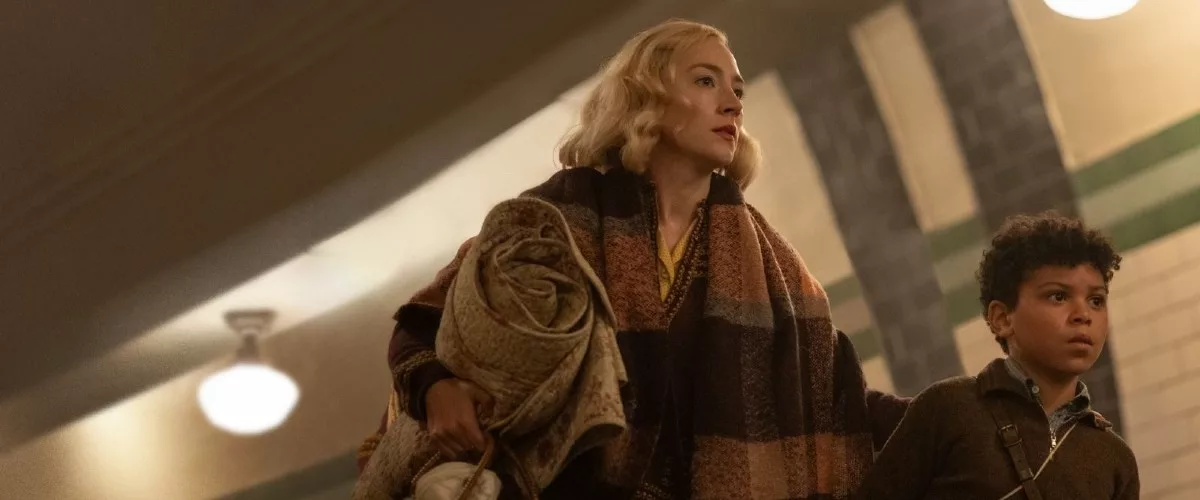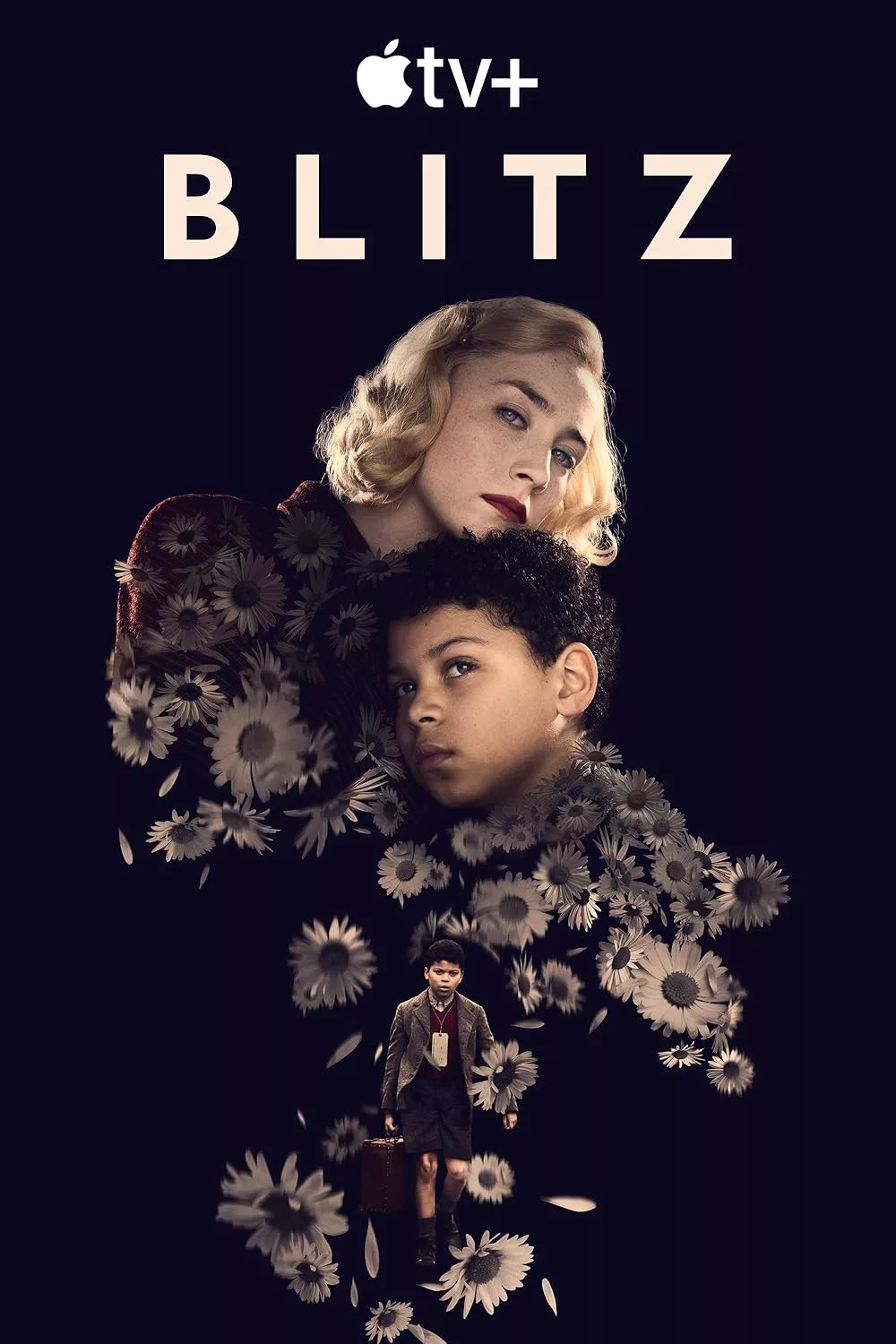In the early years of World War II, Hitler bombed Britain, and the best locals could do was to take shelter in underground tunnels and bunkers and hope for the best. Director Steve McQueen transports his audience back to that terrifying time, opening his new film “Blitz” in mid-attack. Firefighters scramble to control an out-of-control blaze, but the situation looks hopeless, and more bombs are on the way. Soon, the scene switches to a series of images: a closeup of what looks like speeding water, static, and then a silent shot of black and white daffodils before a piano melody takes over and transitions the story to the home of our protagonists. It’s good to see McQueen hasn’t lost his experimental flair, but those moments only offer a brief reprieve from the grim reality of watching war from one’s doorstep.
Rita (Saoirse Ronan), her piano-playing father Gerald (musician Paul Weller), and her precocious 9-year-old son George (Elliot Heffernan) live in a working-class neighborhood under siege from German bombs. Afraid for her son’s safety, Rita sends him to the country, but George, already tired from bullies on the train and homesick, jumps off the locomotive and begins a harrowing journey home. Meanwhile, Rita is holding her own against the demands of factory work, volunteering at a shelter for her displaced neighbors, and memories of the too-brief time she spent with George’s dad before the news of her son’s disappearance throws her world further into chaos.
Certainly, other movies have taken on the Blitz, like “The Life and Death of Colonel Blimp,” “Hope and Glory,” “Atonement,” and “The Chronicles of Narnia: The Lion, the Witch, and Wardrobe,” which begins with a group of siblings heading to the countryside for their safety. But the Blitz here is not a passing coda, invisible threat, or quick sequence of events. McQueen’s film is very much about the ordeal of surviving day after day of terror, death, and destruction. Hans Zimmer scores these events with discordant and jarring notes that sound vaguely electronic and metallic as if the sounds were ricocheting off trains and bombs. George’s story feels shaped by a mix of “Oliver Twist” and “Empire of the Sun,” where a youngster is forced to grow up fast in the face of impossible situations. He navigates death, danger, and the confusing bus system with a determined solemnity, always keeping vigilant should the authorities attempt to put him back on a train to the country. As George, Heffernan delivers a marvelous performance that’s rich and varied, playful and inquisitive, yet brave and stoic. There is danger in almost every turn of George’s way home, and the movie keeps the stakes high until just before the credits roll. The story follows his experience just as closely as it does his mother, Rita, and all of her grown-up problems.
As Rita, Ronan stands out in every shot thanks to her stellar performance as a concerned mother who will stop at nothing to do right by her son, McQueen’s direction, cinematographer Yorick Le Saux, and the production teams that meticulously color coordinated the sets, costume, and makeup to draw our attention to her. Le Saux, whose previous credits include “Little Women,” “High Life,” and “Only Lovers Left Alive,” strikes this sumptuous tone in the lighting, bringing to life the rich colors and period details, like the dark wooden glow of a crowded dance hall, the sea of factory blues, and endless rows of brown brick walls. Rita’s scarlet lipstick and coat pop dramatically into the movie’s focus, not unlike the little red coat in Steven Spielberg’s “Schindler’s List.” The camera uses many closeups to enhance the characters’ experiences, like seeing the mud on George’s shoes after he’s traveled for hours or when Rita’s coworkers draw on tight lines to seem more sophisticated to the lads at the bar. The most rousing scene in the movie is the film’s passionate all-out dance scene in a small club where Rita and George’s father party. As McQueen did in “Lovers Rock,” he once again captures the intoxicating full-body experience of a good round of dancing, and it’s a pleasure to watch even when bookended by terrible events. These details aren’t related to the story, but they ground the audience in the time, emotions, and setting of its characters.
Written and directed by McQueen, “Blitz” explores more than the emotional and physical tensions of the era. It also uncovers the racial prejudices in Britain at the time, a theme he also examined in his impressive “Small Axe” series. As a young biracial boy, George is mercilessly teased by white bullies because he looks different. Years before, his father was attacked on the street, arrested, and deported back to Grenada. When George meets a friendly Nigerian soldier named Ife (Benjamin Clémentine), he tells the soldier he is not Black, and only after seeing Ife step up for other marginalized communities in a shelter does he change his answer and embrace his Black identity. Cinematic representation of the Black British experience in this era is almost nonexistent, and it becomes one of the moving throughlines of the story, even if it feels a bit uneven at times. Some of McQueen’s writing errs on the heavy-handed or clumsy side, which is at odds with the disciplined visual storyteller’s style. Ife’s clunky speech about Hitler dividing people or another man’s comparison of socialism to Christianity, while stirring, lacks the finesse of McQueen’s direction.
Despite these issues, “Blitz” is a jaw-dropping historical drama intensely driven by its characters’ stories. There is always a sense of dread in the air, thick as a London fog. No moment is safe from the haunting wails of air raid sirens. Parties, dinners, and bedtime are frequently interrupted by threats of death from above. Yet, life goes on. Rita returns to her factory job, Gerald listens to the radio, and George plays with his cat until their routine is disrupted. The film is not just a glossy period piece; it’s an emotional story about human resilience, one that’s sadly still too familiar almost a century later.
This review was filed from the premiere at the New York Film Festival. It opens on November 1st.




















